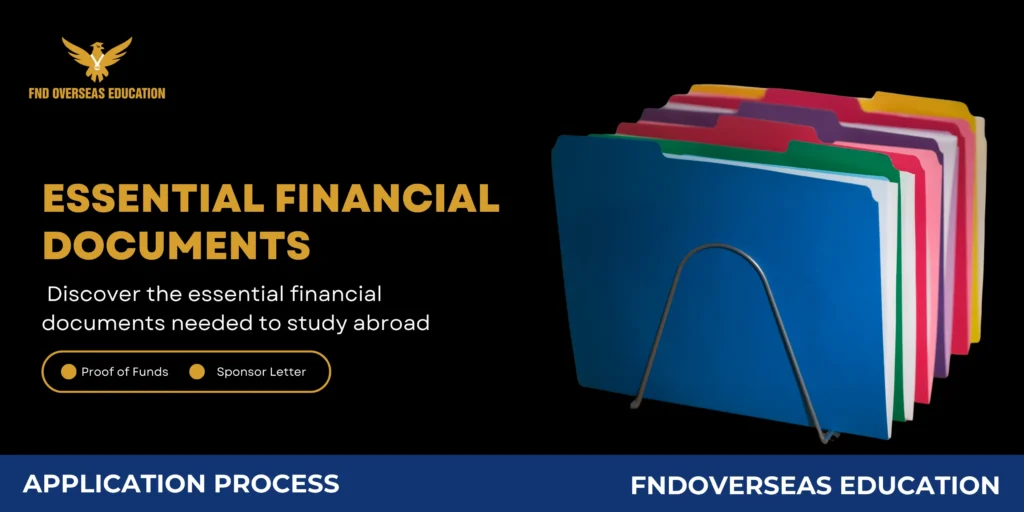Comprehensive Guide to Financial Documents for Studying Abroad in 2024
Embarking on a study abroad journey is an exciting adventure, but ensuring you have all the necessary documentation can be daunting. Apart from academic transcripts, test certificates, and proof of work experience, students need to provide various financial documents to specify their economic stability to live and study abroad.
Financial Documents You Need for Your Study Abroad Journey
Understanding Proof of Funds
Securing a student visa often requires demonstrating your financial capability to cover study abroad expenses. This document, known as Proof of Funds (PoF), assures immigration authorities you can handle tuition fees and living costs throughout your stay.
Who Needs Proof of Funds?
Most countries mandate PoF for student visas. While some universities request it upon admission, it’s typically a visa application requirement.
What Does PoF Demonstrate?
PoF serves as concrete evidence that you possess sufficient financial resources to support yourself during your studies. It’s crucial for obtaining a student visa at many universities abroad.

How to Show Proof of Funds?
Several documents can effectively demonstrate your financial capacity:
- Sponsor Letter: If someone is financially supporting your studies, a sponsor letter outlining their commitment and financial standing is necessary.
- Scholarship Award Letters: Official documentation confirming scholarship awards can contribute to your PoF.
- Bank Statements: Recent bank statements showcasing sufficient funds to cover tuition and living expenses are vital.
Personalized Financial Documentation Support
Are you overwhelmed by the financial documentation required for your student visa? Let us simplify the process for you! Our experts provide personalized support to ensure all your financial documents meet visa requirements. Contact us today to get started on your study abroad journey with confidence
Cost Components for Proof of Funds
PoF typically encompasses two main cost categories:
- University fees: Some universities require upfront payment for these fees to confirm your admission. Receipts for such payments serve as proof. Proof of future payments may not always be needed, but universities might request income verification to ensure your ability to pay future instalments. Sponsorship letters or affidavits of support might be necessary in such cases.
- Note: University fees are subject to change, and there might not be a fixed amount.
- Living Expenses: Many countries have minimum living expense requirements. You’ll need to demonstrate access to these funds.
- Statutory Fund Requirements: In some European countries, you’ll need to have readily available liquid funds to meet these requirements.
- USA: While there’s no set minimum for monthly living expenses, proof of financial support and/or the ability to make payments is required. You’ll need documentation showcasing access to the specified amount for your entire study duration.
- Variations in Living Expense Requirements: Countries might require PoF for one year or the entire course duration.
Sample Proof of Funds Requirements (Subject to Change)
| Country | Minimum Living Expense Requirements | Notes |
| Canada | CAD 10,000 per year of intended stay | |
| United Kingdom | £1,334 per month for London; £1,023 per month for outside London | |
| Australia | AUD $21,041 per year | |
| Germany | €867 per month of stay | Statutory fund requirement |
| France | €615 per month of stay | |
| Netherlands | €850 per month of stay | Statutory fund requirement |
| Sweden | SEK 9,450 or $1,000 per month | |
| Ireland | €7,000 per year of stay | |
| USA | No minimum requirement, but proof of financial support required | University determines estimated costs |
Planning Your PoF:
- Research: Meticulously research the specific PoF requirements for your target country and university.
- Gather Documentation: Collect all necessary documents like bank statements, sponsor letters, and scholarship award letters.
- Ensure Sufficiency: The funds demonstrated should comfortably cover tuition and living expenses for the required duration.
- Scholarship Letters: If you’ve received a scholarship to cover some or all of your expenses, include an official letter from the university or scholarship provider detailing the awarded amount and its purpose.
- Affidavit of Support/Sponsorship: This notarized document (usually on stamp paper) states that another person (parent, spouse, relative) will financially support your education. It confirms their legal obligation to cover your tuition and living expenses. Include proof of their income (bank statements, salary slips) to demonstrate their financial capability.
- Note: Sponsorship requirements differ for European countries. They might not accept support documents from individuals outside the country. Instead, they may require a “Letter of Sponsorship” from a resident willing to support your expenses.
- Bank Letters: These bank-issued letters specify the type of account(s) you (or your sponsor) hold, the account tenure, and the current balance (with converted amounts).
- Loan Capability Certificate (USA): This document, typically requested by US universities during admission, signifies the bank’s willingness to provide you with a loan upon acceptance. It should mention your name, and the loan eligibility amount, and be on the bank’s letterhead with signatures and stamps.
- CA Certificate (Optional): A certified accountant might prepare this document in some cases. It details your/sponsor’s current and fixed assets (bank balances, deposits, property) and their estimated value.
- Property Evaluation Report (Australia/New Zealand): If you’ve secured a student loan against property, you might need this report prepared by a competent authority (e.g., a bank) to verify its value.
- GPF/EPF Statement (India): If applicable, include official statements from your/parent/guardian’s Provident Fund account, specifying the available balance and your ability to withdraw a certain amount.
Tips for a stong Financial Application
Gather Documents in Advance: Start collecting your financial documents well before your application deadline.
Maintain Sufficient Funds: Ensure your bank accounts or sponsor’s accounts reflect sufficient funds to cover your estimated expenses for the entire study period.
Consider Currency Fluctuations: If submitting documents in a foreign currency, account for potential exchange rate fluctuations.
Clarify with Your University/Embassy: Always double-check the specific financial document requirements with your target university or embassy to avoid any last-minute hiccups.
Organise Documents Neatly: Present your documents in a clear and organized manner, often requiring separate folders for each type of document.
Strengthening Your Financial Case for a Student Visa
Financial documents are essential, but they’re just one piece of the puzzle. Here are some additional strategies to strengthen your financial case for a student visa:
- Demonstrate Liquidity: If a significant portion of your funds is in fixed deposits or investments, consider converting some to a liquid form (savings account) to showcase readily available funds for your initial expenses.
- Highlight Income Sources: For sponsored applications, include documents like salary slips or income tax returns of your sponsor to demonstrate their consistent income and ability to support you.
- Showcase Scholarships/Awards: If you’ve received any scholarships, fellowships, or grants, include them to reduce the financial burden shown on your sponsor (if applicable).
- Explain Funding Gaps: If your bank statements or sponsor’s income doesn’t fully cover the estimated expenses, consider providing a detailed budget breakdown explaining how you plan to manage the remaining costs. Part-time work opportunities during your studies (if permitted) can be mentioned as a potential source of income.
Travel and Health Insurance: Proof of travel and health insurance demonstrates financial preparedness for unexpected situations.
- Maintain Transparency: Be honest and transparent in your financial presentation. Avoid fabricating documents or manipulating account balances. Inconsistencies can raise red flags and lead to visa rejection.
- Tailor Your Approach: Adapt your financial documents and explanations based on the specific requirements of your chosen university and destination country.
- Seek Professional Guidance: If you have complex financial situations or require assistance navigating the visa process, consider consulting an immigration lawyer or education consultant specializing in student visas.
Frequently Asked Questions about US Student Visa Financial Documents
How much bank balance should I show in my bank statement for US student visa?
The bank balance should be enough to cover your one year tuition and living costs in the US.
How do I prove my financial support for a visa?
A proof of funds in the form of bank statements, assets, property papers, etc will help you demonstrate that you have enough money to support yourself during your time abroad, thereby indicating strong ties to your home country.
What are the financial documents for US student visa?
Financial documents pertaining to US student visa funds requirements are: 1. Proof of scholarships and grants 2. Personal financial statements and bank statement for US student visa 3. Specific amount of bank balance required for US student visa 4. Statements of support 5. Loan letter (if applicable) 6. I-20 form from your university
Explore popular study abroad destinations
UK
Germeny
Australia
Canada
Ireland
New Zealand
France
Sewdan
Book a 1-on-1 chat with our Experts on Studying Abroad!
Free Experts Assistance
Experienced Counsellors
Contact Us to Find the Perfect Institution for You







Quick Links
Take the First Step Towards Your Study Abroad Dream!
Secure your future with FND Overseas Education and make your study abroad dreams a reality. Reach out to us now for expert advice and start your adventure with confidence!



